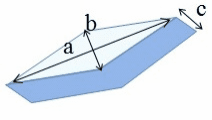
Species details
- Pseudo-nitzschia pungens f. multiseries: Hasle (1993)
- Nitzschia pungens f. multiseries: Hasle (1965)
Solitary cells, which often however superimpose about 1/5 of their length on their neighbour, forming colonies of varying length. The valves are long and symmetrical along the apical axis. In girdle view, the frustule is linear and thread-like. In valve view it appears lanceolate with pointed apices. On the valve surface there are equal numbers of fibulae and striae, which are hard to distinguish by optical microscope, that run parallel to each other for the whole length of the cell, leaving no larger space in the centre of the valve.
- Striae in 10 µm: from 10 to 13 n°
- Fibulae in 10 µm: from 10 to 13 n°
- Apical Axis: from 68 to 140 µm
- Transapical Axis: from 4 to 5 µm
Marine species.
Distribution: in Europe: Denmark (Evans et al., 2004), Germany (Evans et al., 2004), Greece (Moschandreou and Nikolaidis, 2010), Ireland (Cusack, Raine, Patching, 2004), Netherlands (Miller and Scholin, 1996); in North America: California (Lundholm et al., 2006), Brunswick (Evans et al., 2004), Nova Scotia (Evans et al., 2004), Washington (Wang et al., 2012); in Asia: Japan (Hasle and Lundholm, 2005), Korea (Cho, Kotaki, Park, 2001), Russia (Evans et al., 2004); Australia and New Zealand: New South Wales (Ajani et al., 2013), New Zealand (Harper et al., 2012).
This species produces a toxin containing domoic acid, which is responsible for Amnesic Shellfish Poisoning.
Resistence Stages:
This species produces a toxin containing domoic acid, which is responsible for Amnesic Shellfish Poisoning.
Inter- and intraspecific variation of the Pseudo-nitzschia delicatissima-complex (Bacillariophyceae) illustrated by rRNA probes, morphological data and phylogenetic analyses., Journal of Phycology 42:, Lundholm N., Moestrup O., Kotaki Y., Hoef-Emden K., Scholin C., Miller P., 2006, 464-481
Pseudo-nitzschia seriata f. obtusa (Bacillariophyceae) raised in tank based on morphological, phylogenetic and distributional data., Phycologia 44:, Hasle G.R., Lundholm N., 2005, 608-619
Occurrence of species from the genus Pseudo-nitzschia Peragallo in Irish waters., Biology and Environment 104B(1):, Cusack C., Raine R., Patching J.W., 2004, 55-74
The genus Pseudo-nitzschia (Bacillariophyceae) in Greek coastal waters., , Moschandreou K.K., Nikolaidis G., 2010, 159-172.
Phylum Ochrophyta: brown and golden-brown algae, diatoms, silicioflagellates, and kin., In: New Zealand inventory of biodiversity. Volume Three. Kingdoms Bacteria, Protozoa, Chromista, Plantae, Fungi. (Gordon, D.P. Eds), Christchurch: Canterbury University Press., Harper M.A., Cassie Cooper V., Chang F.H., Nelson W.A. e Broady P.A., 2012, 114-163
Pseudo-nitzschia pungens and P. multiseries (Bacillariophyceae): nomenclatural history, morphology, and distribution., Journal of Phycology 31:, Hasle G.R., 1995, 428-435
Microsatellite marker development and genetic variation in the toxic marine diatom Pseudonitzschia multiseries (Bacillariophyceae)., Journal of Phycology 40(5): ,, Evans K.M., Bates S.S., Medlin L.K., Hayes P.K., 2004, 911-920
Identification of cultured Pseudo-nitzschia (Bacillariophyceae) using species-specific LSU rRNA-targeted fluorescent probes., Journal of Phycology 32:, Miller P.E., Scholin C.A., 1996, 646-655
Morphology, phylogeny and ITS-2 secondary structure of Pseudo-nitzshia brasiliana (Bacillariophycea), including Chinese strains., Phycologia 51(1):, Wang P., Liang J., Lin X., Chen C., Huang Y., Gao Y., Gao, Y., 2012, 1-10
The comparison between toxic Pseudo-nitzschia multiseries (Hasle) Hasle and non-toxic P. pungens (Grunow) Hasle isolated from Jinhae Bay, Korea., Algae 16(3):, Cho E.S., Kotaki Y., Park J.G. ., 2001, 275-285
The diatom genus Pseudo-nitzschia (Bacillariophyceae) in New South Wales, Australia: morphotaxonomy, molecular phylogeny, toxicity, and distribution., Journal of Phycology 49(4):, Ajani P., Murray S., Hallegraeff G., Lundholm N., Gillings M., Brett S., Armand L., 2013, 765-785
_635192535325960000.jpg)
_635192535384160000.jpg)
